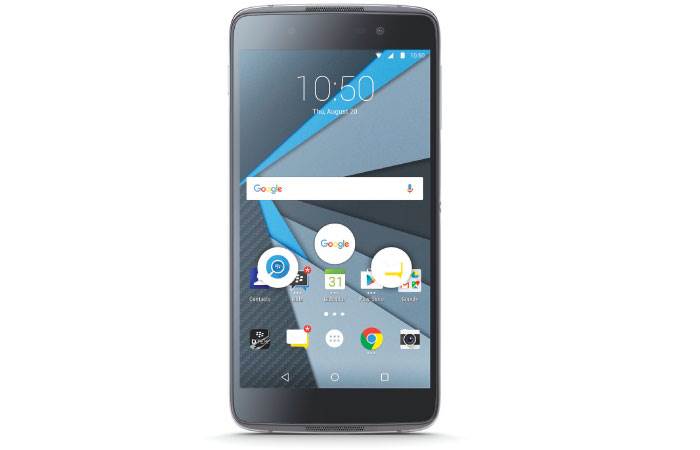Priced considerably lower than BlackBerry’s first Android phone, the new DTEK50 is being touted by the Canadian firm as “the world’s most secure Android smartphone.” Available for pre-ordering today, the $ 299 DTEK50 is set to ship on August 8.
Faced with steadily declining sales of phones running its proprietary BlackBerry operating system, the company last year came out with its first-ever Android smartphone, the $ 699 Priv. Aimed at security-conscious professionals, the Priv has seen disappointing sales, which CEO John Chen blamed on the device’s steep pricetag.
At less than half the cost of the Priv, the DTEK50 still targets buyers who might be concerned that other Android devices fall short on security. BlackBerry says it will deliver Android security patches for the new phone on the same day they’re announced by Google, and has also developed a DTEK app to monitor the device for unauthorized activities by third parties.
App for At-a-Glance Security Performance
The DTEK50 “puts how you share the details of your private life — pictures, locations, texts, and more — entirely under your control,” director of product marketing Trudy Koen wrote today on the Inside BlackBerry blog. The phone’s DTEK app, she added, not only monitors for potential privacy risks but provides users with information on when and how to improve their device security.
“With just a quick glimpse, DTEK tells you the overall security rating for your device (excellent, fair, or poor) along with suggestions for improving it,” Koen noted. “It also tracks your applications and notifies you when an app’s doing something on your device without your knowledge (taking pictures or videos, turning your microphone on, sending a text message, or accessing your contacts/location).”
Citing a survey of Android smartphone users in the U.S. it recently conducted, BlackBerry said it found that half of those questioned believe their devices are “only somewhat secure.” The survey also found that one in six users doesn’t know about Android security patches.
“You wouldn’t leave the doors of your house unlocked at night,” chief security officer David Kleidermacher said today in a press statement. “Having a smartphone that doesn’t take your privacy seriously is the equivalent. It’s equally important for businesses to protect their sensitive data from cyberattacks at all points of their mobile environment — from the device to the network and servers.”
Mobility Sales Continue their Decline
Featuring a 5.2-inch HD display and microSD card support for up to 2 TB of data storage, the 7.4-millimeter-thick DTEK50 is also BlackBerry’s thinnest device yet, the company said. Running Android 6.0 Marshmallow, the phone has a Qualcomm 8952 quad-core processor and a 2610 mAh lithium-ion battery that can support up to 17 hours of talk time.
The DTEK50 has virtually the same hardware specifications as the Chinese-made TCL Alcatel Idol 4, albeit with a newly designed back plate, Ars Technica noted in a review today.
In its most recent earnings report for the first quarter of its 2017 fiscal year, BlackBerry said its Mobility Solutions revenues had declined by 43.5 percent compared to the same quarter in 2016.
“The $ 117 million decrease in Mobility Solutions revenue was primarily attributable to decreased demand and the Company’s aging product portfolio, which was partially offset by an increase in the average selling price from $ 243 to $ 290 with the introduction of the PRIV,” the company noted in its report. Smartphone sales during the quarter came to just 600,000, less than half of what the company sold in the first quarter of 2016.
Upon the report’s release, CEO Chen said the company’s mobility goal is to “achieve operating profitability in the short term.” However, he has also said that if BlackBerry can no longer make its phone business profitable, the company would “get out of the handset business.”







